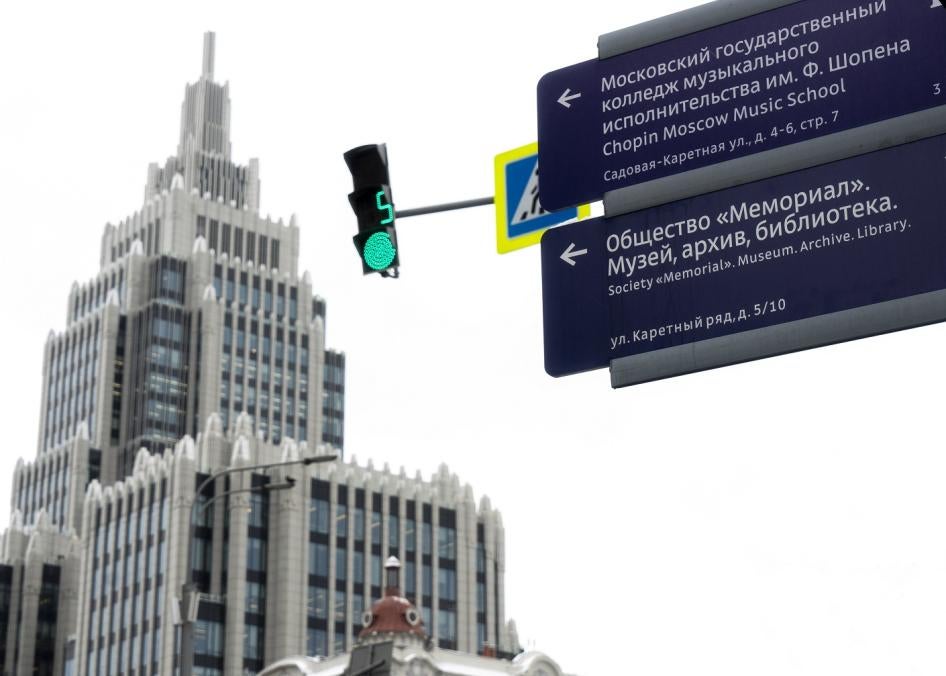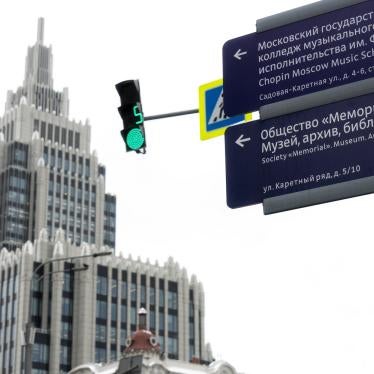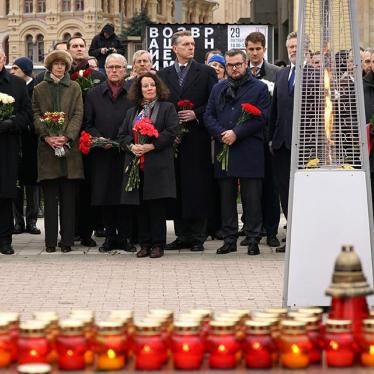In two days, Russian courts have delivered a one-two punch to Russia’s human rights movement. Just a few days after the 30-year anniversary of the collapse of the Soviet Union, courts ruled to close Memorial, Russia’s top human rights group.
Yesterday the Supreme Court granted the Prosecutor General’s request to “liquidate” Memorial International, which for 32 years has worked to commemorate victims of Soviet repression, preserve the facts about The Great Terror, and provide a platform for open debate.
And today the Moscow City Court ruled in favor of the Moscow City Prosecutor’s Office lawsuit to liquidate the Memorial Human Rights Center, Memorial International’s sister organization, which documents a wide range of abuses in Russia, particularly in the North Caucasus, maintains a list of political prisoners and documents human rights violations in neighboring countries.
Formally both lawsuits focused on allegations that Memorial had repeatedly failed to comply with Russia’s repressive “foreign agents” law. Adopted in 2012, the law requires any group that engages in any public advocacy, and accepts even a kopek of foreign funding, to be placed on a “foreign agents” registry, submit additional reports to the authorities, and mark all materials with the stigmatizing “foreign agent” label, which in Russia is tantamount to “traitor” or “spy.” Over the years, the authorities expanded the law’s interpretation so that every single public message, down to each social media post, must be marked. Authorities have even made people go through the Orwellian exercise of labeling posts made years ago.
Ten years of enforcement of the “foreign agents” law has been a war of attrition against Russia’s civil society, which had burgeoned in these past 30 years. Many organizations had to close, have been buried in “foreign agent” inspections and lawsuits, or have had to pay colossal fines. Memorial alone has had to pay 5 million rubles.
As Memorial, and many other groups, persisted with their work, legislators harshened and expanded the scope of the “foreign agents” law, making it applicable not only to just about any civil society organization, but also any individual who publicly criticizes the authorities. It is a crucial part of the web of repressive legislation adopted in recent years to stifle civil society.
As soon as yesterday’s hearing got under way, the prosecutor stopped pretending that this lawsuit was about alleged technical breaches of the “foreign agent” and other harmful regulations, which might have been reflected in the 10 volumes of case materials I saw on the judge’s desk. In his opening speech, the prosecutor accused Memorial of distorting historical memory, especially about World War II, of creating a false image of the Soviet Union, and of doing so because “someone is paying them to do it.”
Today the prosecutor similarly dropped all pretense that the assault the on Memorial Human Rights Center is about mind-numbing bureaucracy, and accused it of “participat[ing] in protests and supporting protests aimed at destabilizing the country,” and claimed that the group’s list of political prisoners “aims to sow negative views about Russia’s judiciary and disinform the public.”
The liquidation petitions made clear the relentless determination of authorities to wrestle back total control over public discussion and memory related to the atrocities of the Stalin era, the Gulag, and more broadly, Soviet-era repression. The Kremlin intends to leave no doubt that only the authorities will assess the Soviet era, and will aggressively silence those who publicly do not conform to the state’s view of the Soviet era and Russian history more broadly. The moves against Memorial underscore that the authorities will not just seek to make life as difficult as possible for civil society groups that don’t conform to the state’s agenda, but will shut them down.
The rulings come at the end of a remarkably terrible year for human rights and democracy in Russia, during which authorities threw top opposition figure Alexei Navalny in prison, banned the organizations affiliated with him, and arrested several of his close associates; designated more than 100 people as “foreign agent media”; doubled down on internet censorship; detained thousands of peaceful protesters, and the list goes on.
The closures are not the only bad news from the closing days of 2021: authorities also increased the 13-year sentence of a Memorial historian, convicted on very dubious charges, to 15 years; blocked the human rights group OVD-Info’s website; interrogated a human rights activist investigating the disappearance of dozens of people in Chechnya; and moved to evict Russia’s top refugee assistance group from their office.
Memorial is appealing both rulings, and has indicated that they will go to the European Court of Human Rights if need be. However, the authorities have the power to take steps to reverse course. They could annul the rulings, revoke the slew of laws aimed at silencing free expression, and release Navalny and his affiliates.
Try as it may, Russia can’t wipe out historical memory or force people to stop working to protect their rights.










